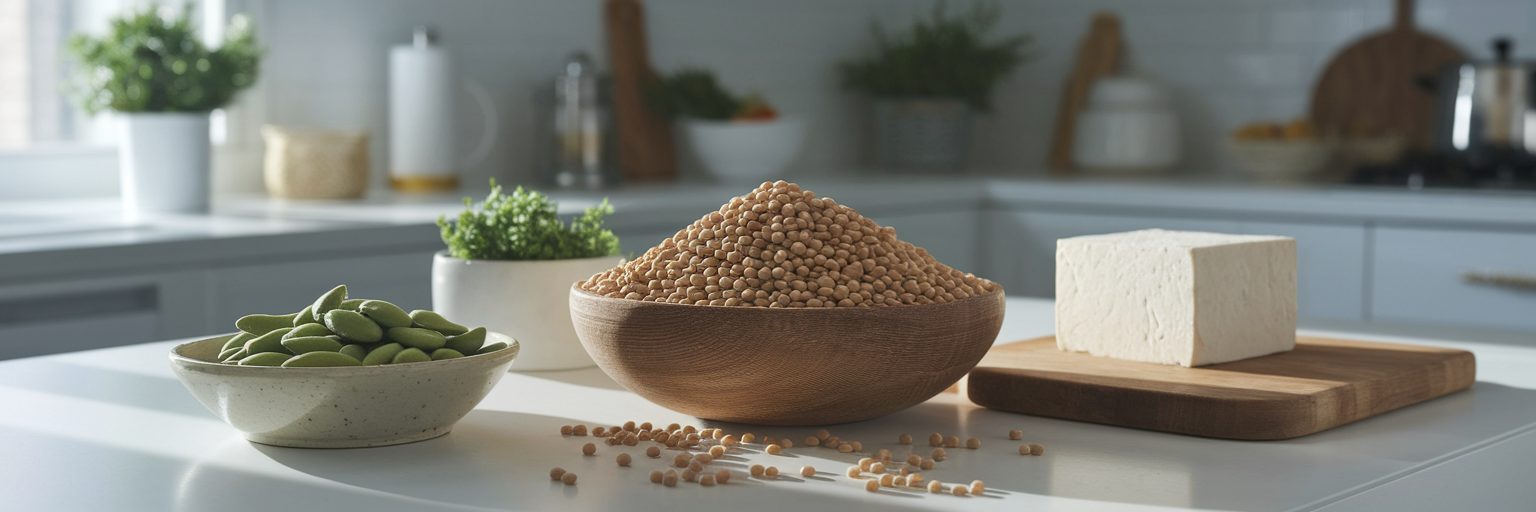Setting the Stage for Your Success
It feels like everyone is a little more curious about plant-based eating these days, and for good reason. A recent Gallup poll found that nearly one in four Americans have cut back on meat, many in search of better health. If you're exploring a vegan diet for weight management, you're in the right place. But let's be honest, there's probably a nagging question in the back of your mind: "Will I be hungry all the time?" It's a common concern, rooted in the myth that a plate without meat is a plate without protein.
This guide is here to put that fear to rest. We're going to walk through, step-by-step, how you can use delicious plant-based proteins to not only meet your goals but also feel satisfied and energized along the way. Think of this as a friendly chat to demystify vegan protein and show you how to make it work for you, without any complicated rules or deprivation. You've got this.
Why Protein Is Key for Weight Management
So, why does everyone talk about protein when it comes to managing weight? It’s not just hype. Protein plays a few very specific and helpful roles in your body, especially when you’re being mindful of your calorie intake. Understanding the "why" makes it much easier to build habits that stick.
The Satiety Factor: Feeling Fuller, Longer
Have you ever eaten a big meal and felt hungry again an hour later? That’s often what happens with meals high in simple carbs and low in protein. Protein is the superstar of satiety. It helps you get the most fullness for your calorie buck, signaling to your brain that you're satisfied. This is the secret to how to feel full on a vegan diet. When you feel genuinely full, you're far less likely to reach for unplanned snacks, making it easier to stay on track.
Protecting Your Hard-Earned Muscle
Think of your muscle as your body's metabolic engine. It burns calories even when you're just sitting on the couch. When you're in a calorie deficit to lose weight, your body can sometimes break down muscle tissue for energy, which is the last thing you want. Getting enough protein helps protect that precious muscle mass, keeping your metabolic engine running strong. As the Obesity Medicine Association highlights, adequate protein intake is essential for preserving lean muscle mass and promoting satiety.
A Small Metabolic Advantage
Here’s a little bonus: your body uses more energy to digest protein compared to fats and carbs. This is known as the Thermic Effect of Food (TEF). While it’s not a magic bullet for weight loss, it does give your metabolism a small, helpful nudge. It’s just one more way that prioritizing protein supports your overall efforts.
Your Go-To Guide for Plant-Based Proteins

The world of plant based protein sources is incredibly diverse and delicious. Forget the idea that you'll be stuck eating bland salads. From hearty legumes to versatile soy, there's a whole pantry of options waiting for you. Let's explore some of the most popular and accessible choices.
Legumes: The Humble Powerhouse
Lentils, chickpeas, black beans, and kidney beans are some of the most affordable and nutrient-dense foods on the planet. They are packed with protein and fiber, a combination that is fantastic for fullness. Try adding a cup of lentils to your next vegetable soup or tossing a handful of chickpeas into your salad for an instant protein boost.
Soy-Based Superstars: Tofu, Tempeh, and Edamame
Soy gets a lot of attention for a reason. Tofu is incredibly versatile; its firm varieties are perfect for stir-fries or scrambles, while silken tofu can add creaminess to smoothies and desserts. Tempeh, made from fermented soybeans, has a firmer, chewier texture and a nutty flavor that’s amazing in sandwiches or crumbled into pasta sauce. And edamame is a simple, satisfying snack on its own.
Mighty Grains and Seeds
Even grains and seeds can be a great source of protein. Quinoa is a standout because it’s a complete protein, meaning it contains all nine essential amino acids. Seeds like chia, hemp, and flax are easy to sprinkle over oatmeal, yogurt, or blend into smoothies. Just a few tablespoons can add a significant protein punch to your meal.
Convenient and Concentrated Options
For those times you need a quick and powerful protein source, there are some great concentrated options. Seitan, made from wheat gluten, has a remarkably meat-like texture and is very high in protein. And of course, plant-based protein powders can be a lifesaver for busy schedules. With so many options available, it can be helpful to know what to look for. You can learn more about some of the best protein powders we recommend to find one that fits your needs.
| Protein Source | Approx. Protein per Serving | Best For | Pro Tip |
|---|---|---|---|
| Lentils (1 cup, cooked) | 18g | Soups, stews, salads, veggie burgers | Their earthy flavor pairs well with smoky spices like cumin and paprika. |
| Tofu (1/2 cup, firm) | 22g | Scrambles, stir-fries, baking, marinades | Pressing tofu removes excess water, allowing it to get crispier and absorb more flavor. |
| Tempeh (3 oz) | 16g | Sandwiches, salads, 'bacon' strips | Steaming tempeh for 10 minutes before marinating can reduce its natural bitterness. |
| Quinoa (1 cup, cooked) | 8g | Salad bases, side dishes, breakfast bowls | Rinse quinoa before cooking to remove saponins, a natural coating that can taste bitter. |
| Hemp Seeds (3 tbsp) | 10g | Smoothies, oatmeal, yogurt, salads | They have a mild, nutty flavor and a complete amino acid profile. |
Smart Strategies to Boost Your Daily Protein
Knowing what to eat is one thing; fitting it into your daily routine is another. The key is to make small, simple adjustments throughout your day. Here are some easy strategies for creating high protein vegan meals without spending hours in the kitchen.
Start Your Day Strong with a Protein-Packed Breakfast
A protein-rich breakfast sets the tone for the whole day, helping to manage cravings from the start. Instead of a plain piece of toast, try one of these:
- A savory tofu scramble with spinach and mushrooms.
- A smoothie blended with a scoop of plant-based protein powder, berries, and a spoonful of hemp seeds.
- Oatmeal topped with nuts, seeds, and a dollop of soy yogurt.
Rethink Your Snacks for Lasting Energy
That 3 p.m. slump is often a call for energy. Instead of reaching for something sugary, choose a snack with protein and fiber to keep you going.
- A handful of roasted chickpeas seasoned with your favorite spices.
- Apple slices with a side of peanut or almond butter.
- Hummus with crunchy veggie sticks like carrots, cucumbers, and bell peppers.
Build Your Lunch and Dinner Around Protein
A simple mental shift can make a huge difference. Instead of thinking of protein as a side dish, make it the star of your plate. Start by choosing your protein source—like baked tempeh, a black bean burger, or a lentil stew—and then build the rest of your meal around it with plenty of vegetables and a healthy carb.
Incorporate 'Protein Boosters' into Your Cooking
You can sneak extra protein into your meals with a few clever additions. If you're looking for some delicious inspiration, check out these 3 easy vegan protein recipes you'll actually crave.
- Sprinkle nutritional yeast over pasta, popcorn, or steamed veggies for a cheesy, savory flavor and a protein kick.
- Blend silken tofu into soups and sauces to make them creamy and protein-rich.
Beyond the Scale: Long-Term Health Perks

While your initial goal might be weight management, embracing vegan protein for weight loss brings a host of other benefits that contribute to your overall well-being. It’s about building a healthier relationship with food and creating habits that serve you for life.
Cultivate a Healthy Gut Microbiome
Plant-based proteins like beans, lentils, and whole grains are loaded with fiber. This fiber is exactly what the good bacteria in your gut love to eat. A healthy gut microbiome is linked to everything from better digestion to a stronger immune system. In fact, research published by the National Institutes of Health (NIH) highlights that plant-based diets are associated with improved gut microbiota, a key factor in long-term health.
Enjoy Nutrient-Dense, Lower-Calorie Meals
One of the beautiful things about plant-based foods is their nutrient density. You can often eat larger, more satisfying portions for fewer calories compared to highly processed foods. A big, colorful salad topped with chickpeas, quinoa, and seeds is filling, delicious, and packed with vitamins and minerals, leaving you feeling nourished, not deprived.
Build Sustainable Habits for Life
The most effective approach to health is one you can stick with. Because a plant-rich diet is so varied and flavorful, it feels less like a restrictive diet and more like an enjoyable lifestyle. You're not just counting calories; you're discovering new foods, trying new recipes, and building a positive, sustainable way of eating that will support your health for years to come.
Your Path to Lasting Success
You're now equipped with the knowledge to make vegan protein a powerful ally on your wellness journey. Remember the key takeaways: protein is your friend for feeling full, the plant kingdom offers an incredible variety of delicious sources, and a few simple strategies can make all the difference. Of course, balance and mindful portions are always important, no matter what you're eating.
If you found this guide helpful, why not share it with a friend who might be curious too? And if you're looking for a simple and delicious way to meet your daily goals, our clean, plant-based protein powders are a great place to start. Our Chocolate Vegan Protein is a customer favorite for a reason—it's smooth, delicious, and packed with the fuel you need. Feel free to browse all of our plant-based supplements to find the perfect fit for your wellness journey.



